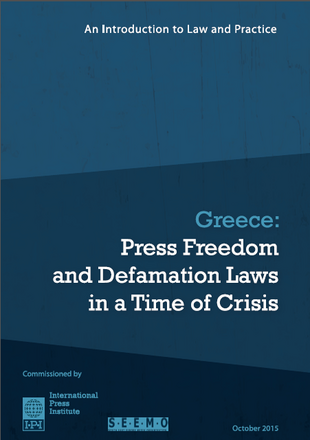
Greece: Press Freedom and Defamation Laws in a Time of Crisis
Defamation laws are more and more used to limit freedom of expression in many fields, such as arts, culture, and journalism. The increasing resort to defamation laws against journalists by politicians, businessmen, and public figures involved in scandals has led journalism to self-censorship.
The case of Greece is particularly pernicious and the economic crisis exacerbates the phenomenon.
This report focuses on personality rights and defamation laws, including the interpretation of these laws by the Greek courts. The 1975 Greek Constitution, promulgated in 1975 contains strong proclamations about the freedom of speech. Nevertheless, the Greek constitutional framework for press and media freedom has clear pitfalls for the work of journalists. Journalistic freedom in Greece is subject to laws protecting privacy, honour and reputation.
In the case of freedom of expression, personality rights (the right of an individual to control the commercial use of his name) enjoy a high level of protection under the Greek Constitution. As such, the opposing values in civil and criminal defamation cases (free expression on the one hand and the protection of honour or reputation on the other) are a priori equal. There is nothing in the Greek Constitution that suggests that the two provisions cannot be reconciled or effectively balanced. However, since Greek courts generally understands defamation to involve the active infringement of the victim’s personality rights, the ‘balancing exercise’ between the two values is based solely on limitations to freedom of expression.
The defences for the press are broadly formulated and cannot always be invoked effectively. The Vaxevanis’ case is exemplar. Kostas Vaxevanis is the owner and editor of the magazine Hot Doc. In 2012, he was arrested over the magazine’s publication of a document claimed to be the Lagarde list, a list of 1991 names of Greek customers with accounts at the Swiss branch of HSBC, suggesting that they could be tax evaders. He was charged with “interfering with sensitive personal data”. Vaxevanis’ trial began and ended the same day with an acquittal. The report includes an interview with Vaxevanis focused on self-censorship and abuse of defamation by the political and economic system in order to silence independent journalism. The case of Vaxevanis showed the international community that defamation laws are still utilised to cover scandals even in the heart of Europe.
The report presents a broad overview of the regulations concerning defamation in the Greek civil and criminal codes. After examining the case study about Kostas Vaxevanis, it then formulates recommendations to improve the current regulation.
Tags: Greece Defamation and Libel Media freedom PrivacyThe content of this article can be used according to the terms of Creative Commons: Attribution-NonCommercial 4.0 International (CC BY-NC 4.0) . To do so use the the wording "this article was originally published on the Resource Centre on Media Freedom in Europe" including a direct active link to the original article page.

